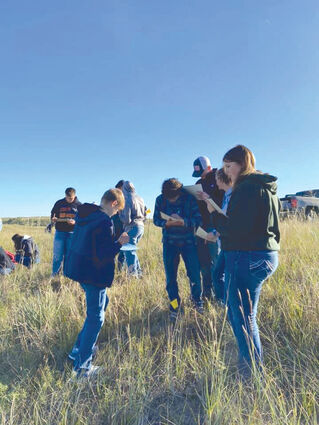Home on the range
Summerland FFA students gain understanding of rangeland ecosystems
October 7, 2021

Courtesy Photo
Test your knowledge • FFA students identify plants during district range judging, held in September. The contest consists plant identification, ecological site station, decision-making scenarios and a multiple choice quiz.
In early September, Summerland FFA members learned the importance of knowing how to read a field.
There's more to range judging, according to Summerland FFA Advisor Jacob Goldfuss.
"Because there is so much to this contest, preparing students for it can be quite a challenge," he said.
A quick primer on range judging: Participants gain a comprehensive understanding of rangeland ecosystems in order to make range management decisions.
"A proficient 'range judger' will be able to take one look at a section of range land and understand the following about it and make decisions, such as whether or not it consists of diverse species of plant life, whether or not it is healthy, if it can sustain a herd of cattle, if cattle need to be rotated out, if a cross fence needs to be put in, if noxious weeds need to be controlled," Goldfuss said.
The competition consists of a variety of components.
Students visit four stations to identify plants. A total of 24 plants must be identified.
Students give the common name of each plant, as well as the life form, such as grass, grass-like, forb, cactus or shrub. Additional information students should know includes life span, origin (native or introduced, growth season, growth form and livestock forage value.
Students do not receive a word bank or list of plants.
"Every aspect of the plant identification portion is based on pure memory alone," Goldfuss said.
The second component involves an ecological site, similarity index and degree of use stations.
Goldfuss breaks it down in laymen's terms.
First, students identify the soil type of the rangeland. Then, they identify plants in a designated section and compare the current plants to an "ideal" plant community. This is how the similarity index score is calcuated.
Then, students evaluate what percentage of grass cattle used or grazed for the degree of use.
The third step includes a ranch map scenario. Students are required to make range management decisions, based on a drawing of the ranch.
"They calculate the carrying capacity and stocking rate of said ranch. There is a lot of math involved," Goldfuss said.
The final portion of the judging is a 10-question multiple choice quiz.
"There is a lot that students must do at a range judging contest. So much so that it can be pretty overwhelming for new agriculture students," Goldfuss said.
For FFA members considering a career in livestock production, range judging is an important and practical skill.
Goldfuss gave an example of putting cattle in a field of weeds versus a field of grass.
"That is going to greatly impact the overall health of your herd and the operation as a whole."
Students interested in natural resources also benefit from the competition, as they navigate evaluating varying ecosystems and their health.
"The identification of noxious weeds would also be a useful skill for anyone going into natural resources," Goldfuss said.
FFA students who do not plan to pursue a career in those types of fields gain valuable skills, including work ethic, time management and "the ability to do multiplication without the use of a calculator."
Madison Melcher, a senior FFA member, said while she has not participated in range judging previously, she learned what is important to look for.
"I learned that it is important to be able to identify plants in a field to know which ones the animals may eat or if they are poisonous. Figuring out how to know which plants are which was very difficult since we have never done it before and not having a lot of time to practice because of our late start to the school year."
Goldfuss said approximately 350 students participated in the contest, which is not limited to only FFA members.
West Holt FFA Advisor David Gibbens hosted the meet Summerland attended.
Goldfuss said official contests, including the Area and State Range Judging contests, are sponsored by natural resources districts.



Reader Comments(0)